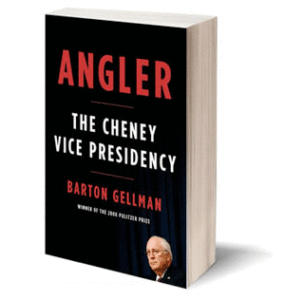THE NEW YORK TIMES BESTSELLER
LOS ANGELES TIMES BOOK PRIZE: Angler wins top nonfiction honor of 2008.
NOTABLE BOOKS OF 2008: Angler is selected by the NY Times, Washington Post, LA Times, Harper’s, Amazon, B&N, Daily Beast — and more.
Jacob Heilbrunn in the NYT Book Review: “engrossing and informative … the most penetrating portrait of him yet”
Sam Tannenhaus The New Republic: “a triumph of reporting on a figure who … has demonstrated unparalleled skills at remaining unknown”
Steve Clemons in the American Conservative: “an indispensable volume without which the Bush presidency can’t be understood.”
Al Hunt, ex DC bureau chief, Wall Street Journal: “superb biography”
Nina Totenberg on National Public Radio: “an extraordinary book”
James Mann in the WP: “Until now I assumed it would take decades … for an author (say, some future Robert Caro) to uncover and describe Cheney’s secretive role.”
Jon Stewart on the Daily Show: “It’s unbelievable. I mean, get this. Just spend one night reading it by the fire, and see if you can sleep again.”
Clive Crook in the FT: “a remarkable tale extremely well told.”
Michiko Kakutani in the NYT: a “forceful new study … connecting the dots to give the reader a visceral understanding of just how Mr. Cheney maneuvered….”
Tom Carson (Esquire critic): A “mesmerizing guided tour”
Peter Beinart in the Daily Beast: “An amazing expose”
Barton Gellman shared the Pulitzer Prize in 2008 for a keen-edged
reckoning with Dick Cheney’s domestic agenda in The Washington Post. In
Angler, Gellman goes far beyond that series to take on the full scope of
Cheney’s work and its consequences, including his hidden role in the
Bush administration’s most fateful choices in war: shifting focus from
al Qaeda to Iraq, unleashing the National Security Agency to spy at
home, and promoting “cruel and inhuman” methods of interrogation. Packed
with fresh insights and untold stories, Angler describes a man of deep
conviction and remorseless will who reshaped his office and his times.
Dick Cheney played a paramount role in decisions that ranged from war
and peace to the economy, the environment, and the meaning of the law.
His hand was often unseen even by colleagues. Gellman parts the curtains
of secrecy to show how the vice president operated and what he wrought.
more…
Angler tracks Cheney’s trajectory through two terms as a loyal and
valued adviser who nonetheless posed dangers to the president he served.
In one riveting narrative, Gellman describes a lengthy crisis over NSA
surveillance in which Cheney’s close hold on information left even
George Bush out of the loop. BlackBerry messages, contemporary notes,
and on-the-record interviews take us inside urgent meetings in the vice
president’s office, the Situation Room, the White House counsel’s living
room, and the president’s private study. In documentary detail, Gellman
shows how Cheney’s unyielding course brought Bush to the brink of ruin
before the president veered away.
Cheney redefined his job before he even joined the ticket in 2000.
Angler offers vivid details of his selection as running mate, his
command of the presidential transition, and his habit of “reaching down”
to steer Bush’s options. September 11 amplified Cheney’s importance, and
Gellman shows how he guided the “war on terror” toward Iraq, domestic
espionage, gloves-off interrogations, and a doctrine of preventive war.
Above all, Cheney encouraged Bush to assert a supremacy as commander in
chief that no president had claimed before.
Bush was the decider when he chose to be, and Cheney gave few public
hints of dissent. Angler shows, through those episodes of disagreement,
how different a Cheney administration would have looked. Yet the vice
president sometimes managed, directly and through proxies, to reopen
debates he had lost. On global warming, tax cuts, Supreme Court
nominations, CIA secret prisons, and Guantánamo Bay, Cheney steered
around Bush’s political instincts.
Angler is a work of careful, concrete, and original reporting, backed by
hundreds of interviews with Cheney’s allies and rivals. Above all, it is
a study of the Bush administration through the lens of its canniest
player, shedding light on the president’s legacy and the dilemmas that
await his successor.
More than two thirds of Angler is new material, never published before. Highlights include:
- The week that Cheney nearly led Bush off a cliff, keeping him unaware of a dispute that threatened his presidency. White House and other top officials speak on the record about an episode that one of them describes as nearing “Watergate territory.”
- Why a top official sent a BlackBerry message, just after leaving the Oval Office, saying he told the president “he was being misled” by Cheney and his allies.
- How Cheney killed a State Department proposal to close secret CIA prisons, deleting it from the agenda of an NSC meeting.
- Cheney’s work with Don Rumsfeld at the Pentagon to slow-roll an emphatic order from Bush on the handling of detainees at Guantanamo Bay. In one scene, their tactics send a cabinet-rank official, cursing, out the door of the Situation Room and leave another one at the table in tears.
- Intelligence gathering by Cheney’s office about policy rivals, including requests for NSA transcripts of their intercepted conversations with foreign officials.
- The vault in Cheney’s wing of the Eisenhower Executive Office Building that served as the command center of a major intelligence program, the first to be conceived and controlled by a vice president.
- What Cheney told a top congressional Republican about Saddam Hussein—a claim, undisclosed until now, that the GOP leader now says Cheney “knew to be untrue.” Speaking on the record, the Republican leader says Cheney will be remembered for “the biggest foreign policy blunder of modern times.”
- On the record interviews with three Cheney advisers who describe his real motives for — and private doubts about — pressing the war with Iraq.

